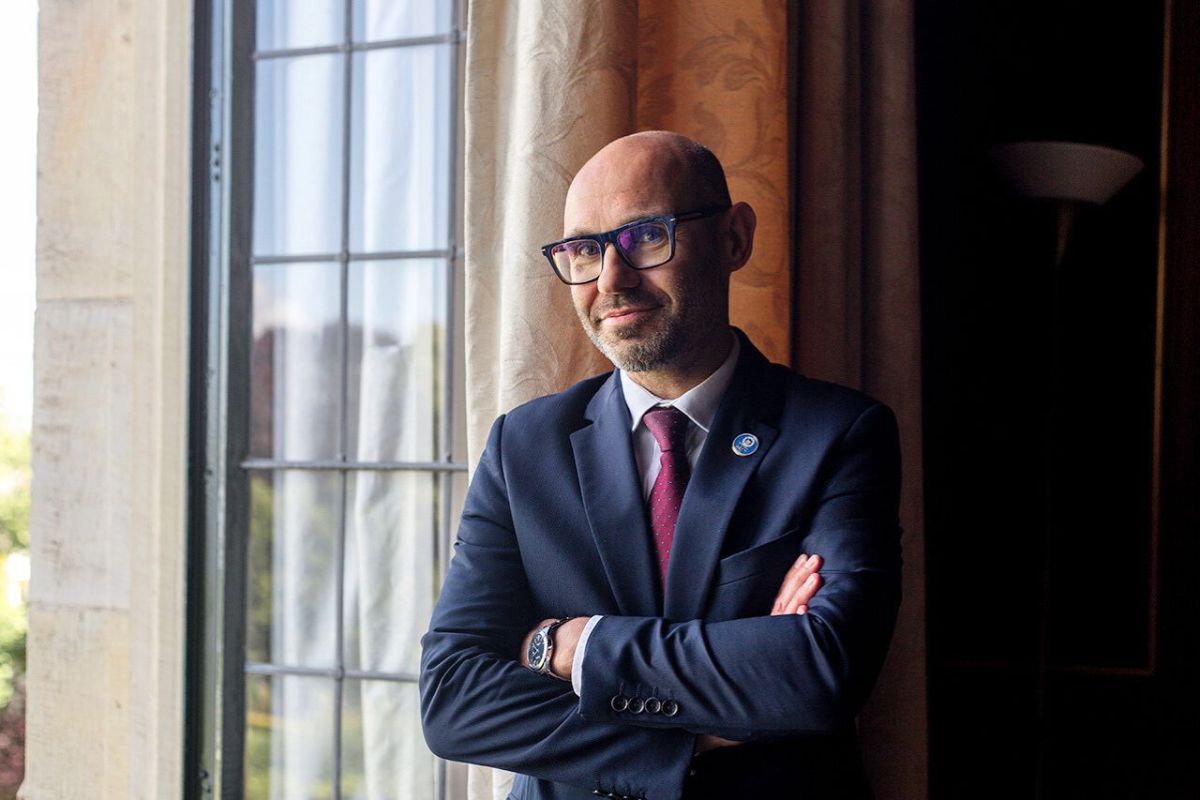Working at the Permanent Court of Arbitration (PCA) is cool
On a sunny Thursday afternoon, we met with His Excellency Marcin Czepelak, the Secretary-General of the Permanent Court of Arbitration (PCA). He invited us to his office, which is the Peace Palace. Quite stunned by the magnitude of the building we entered the grand entrance, ready to ask all the ins and outs.

Text and photography by Sacha Celine Verheij
Can you tell us a bit about yourself?
My name is Marcin Czepelak. I am an international lawyer, who became a diplomat and now is working for the oldest international court. In the old days, I was a professor in private international law, who advised parties and institutions on international law, litigation and arbitration issues. Previous to my appointment as Secretary-General of the Permanent Court of Arbitration (SG of the PCA) I served as Polish ambassador to the Netherlands. I should add that this was not my first encounter with The Hague, as I had arrived here for the very first time in 2001 for the summer course of The Hague Academy of International Law. Then I could not predict that I would end up as the SG of the PCA!
What does a PCA Secretary-General do on a daily basis?
My son asked me the other day what my work is all about. After I tried to explain it in the most accessible way, he looked at me and said: “Dad, so you just told me that you get paid to talk to people?”
Is that true, that your job is talking to people?
To some extent he was right, I talk a lot, but I do it professionally: I know to whom to talk, how, and what needs to be said. Nevertheless, talking only would not be enough. In fact the position of the PCA Secretary-General demands three kinds of experience: international law, diplomacy and management. As the head of the PCA, you need to have a legal background, build and maintain relationships as well as manage a growing organization.

It looks like Downton Abbey here, but what happens here is more like Suits. We have lawyers working day and night on cases.
What is the PCA and what does it do?
The PCA was the very first institution for international dispute resolution, established in 1899 by the first Hague Peace Conference. We help to solve international conflicts through peaceful means of settlement and have been doing that for 125 years now. Those who we help differ from states to international organizations, from private parties to state owned enterprises. The cases span a range of legal issues involving maritime boundaries, human rights, sovereignty, international investment, trade among others.
Can you explain how the PCA solves disputes through peaceful settlements?
We have different ways of solving disputes, ‘arbitration’ is in our name, as it is indeed a very old legal institution. Unlike judges appointed by a state, or states, arbitrators are appointed by parties to the dispute. Usually, each party appoints one arbitrator, who in turn appoints a presiding arbitrator establishing a tribunal composed of three. However, the PCA has never meant to offer only arbitration. We solve conflicts through a range of methods: mediation, conciliation, fact-finding commission of inquiry, arbitration, expert and review procedures.
Can you share a particular case where you felt the PCA has made a profound impact on international peace and justice?
We have a lot of ongoing cases, around 250. Last year we received a record number of 82 new cases. However, to answer your question, I would like to refer to the Timor Sea Conciliation which started in 2016 between the Timor-Leste and Australia. As a result of the conciliation process both states resolved the long-lasting conflict over maritime boundary by signing a treaty. The PCA was crucial in facilitating this agreement.
Sometimes it feels like Indiana Jones, there are lawyers getting into helicopters to look for historical evidence of border markers.

How do you think the work of the PCA is perceived by the public in The Hague?
I wonder to what extent the public is interested in the work of these kinds of bodies. We are now in the iconic building of The Hague, the Peace Palace. But how many people know that it was built to be headquarters of the PCA? I hope that thanks to this interview people will learn more about what’s behind the facade of the building. You may think that it looks like Downton Abbey, but what happens here is more like Suits. We have lawyers working literally day and night on cases, but not only behind a desk or in the courtroom. Sometimes it feels like Indiana Jones, there are lawyers getting into helicopters to look for historical evidence of border markers somewhere in jungle. You wouldn’t imagine at all in international law cases, that adventure can be involved. Working at the PCA is cool!
What is your vision for the future of the PCA?
Firstly, universalization. What I mean by this is that the PCA should be accessible to all at all times. That is the core of the mission, that is our mandate. As international conflicts become even more diverse and complex, the PCA must adapt and evolve, increasing its accessibility and presence beyond The Hague. This is why we have been developing cooperation with our Contracting Parties. Some of them would like to host the PCA so that we can organize hearings in their territory. Moreover, the PCA has opened five international offices, where our lawyers work on cases in the same way as in the Peace Palace: in Buenos Aires, Hanoi, Mauritius, Singapore and Vienna.
There is no other place in the world which has the same kind of legacy.
Secondly, most of our procedures are arbitration. I feel committed to promoting alternative methods of dispute resolution, other than arbitration. That’s why the success story of Timor and Australia is so important.
What does it mean to you personally to be working in The Hague?
The Hague is unique, it is the city of peace and justice. The first of this kind peace conference of states, that laid foundations of the modern multilateralism happened here, 125 years ago. There is no other place in the world which has the same kind of legacy. It gives me a sense of urgency, a call for action. I feel committed to those who worked at the PCA before me and those who will come here after me to maintain and serve the peace.
At the end of the day, once you handled different time-sensitive issues from different parts of the world in different languages, it is a nice feeling to go to the beach of Scheveningen and just watch the sunset. Despite the common prejudice, the water in Scheveningen is warm enough to swim!
Lastly, what book or film would you recommend to our readers if you want to learn more about PCA?
We are preparing a book with photos for the 125th anniversary of the PCA. For now, I would recommend visiting our website www.pca-cpa.org. You can find a lot of interesting information; you can even watch cases.



